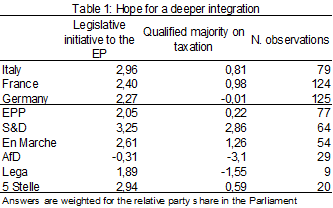European fiscal reform preferences of parliamentarians in France, Germany, and Italy
Blesse S., Bordignon M., Boyer P. C., Carapella P., Heinemann F., Janeba E., Raj A., 2022 – European Union Politics
What do parliamentarians in the larger countries of the EU think about further integration in European policy making? On the eve of the European elections, it is certainly worth asking this question, in light of the significant crises we have faced in recent years (first the pandemic and then the energy crisis). What challenges will we have to face as Europeans in the future, given the increasingly frequent geopolitical tensions, the need to complete the digital and environmental transitions and regain competitiveness compared to other major international players (USA and China)? Is the current European institutional framework adequate to respond to these challenges? If not, on which aspects is it politically viable or necessary to make further progress? Asking national parliamentarians is helpful because they are the ones who should primarily approve any reforms in the European construction.
To answer these questions, a team of European scholars submitted, a few years ago, the same questionnaire to Italian, French, and German parliamentarians, expressed in their respective national languages. Respondents were guaranteed anonymity to encourage honest answers, ranging from strongly opposed to firmly in favor, with various intermediate possibilities. Of course, it can be argued that for a particular proposal to be approved at the European level, the support of the parliaments of the three most important countries in terms of income and population may not be sufficient. However, it is likely to be a necessary condition. The survey was conducted before the pandemic (the questionnaire is from 2018), in a radically different world and with different political compositions since then, but as will be discussed, some results continue to be relevant even in today’s Europe. The analysis of the questionnaire responses has recently been published in European Union Politics by Sebastan Blesse, Massimo Bordignon, Pierre C. Boyer, Piergiorgio Carapella, Friedrich Heinemann, Ekhard Janeba, and Anasuya Raj in the article “European fiscal reform preferences of parliamentarians in France, Germany, and Italy”.
The paper seeks to analyze the results of the questionnaire about three factors that could explain differences in opinions: nationality, party ideology, and whether the parliamentarian belongs to a populist party. The empirical analysis of the responses, including various controls for the personal characteristics of the respondents, provides three main results. (a) On average, German parliamentarians are the least favorable to further integration, while the French are the most favorable. Italians take an intermediate position, on average: they are more opposed than the French on some issues (e.g., the introduction of European taxes), more supportive on others (e.g., Eurobonds). (b) Ideology matters; it is not just a national positioning. Regardless of the respondents’ nationality, center-left parties present much more pro-European positions than center-right parties. (c) Populist parties, compared to non-populist ones, are uniformly more opposed to further European integration.
Also interesting, in light of future challenges, are the responses regarding some proposals to modify the functioning of the EU governance to make it more capable of making timely decisions and potentially increasing the size of the EU budget. Specifically, we asked parliamentarians for their opinion on granting legislative initiative (currently a prerogative of the Commission) to the European Parliament and on shifting from unanimity to a qualified majority for decisions on direct taxation at the EU level.
On the first aspect, it is interesting to note that all parliaments (Table 1) and all parties, except for Alternative for Germany AfD (moderately negative), declare themselves in favor of granting legislative initiative to the European Parliament. This is an important result, because the European Parliament tends to divide along party lines rather than national ones, and a more active legislative role would certainly help overcome the various national vetoes that influence European decisions.

On the second aspect, it is important to note that all parliaments – including the German one, if we do not consider the position of AfD – moderately favor introducing a qualified majority instead of unanimity for decisions related to direct taxation, especially on businesses and capital. This indicates a widespread perception that tax competition within Europe, allowed by the free movement of capital and businesses along with purely national decisions on taxation, negatively impacts large countries’ budgets. Only the Lega (although it represents a minority on this issue in the Italian context) and AfD are negative on this proposal. However, whether real progress can be made on this front is conditioned by the staunch opposition from countries like the Netherlands, Ireland, and Luxembourg, which have always been the major beneficiaries of tax competition.
Changing the governance of the EU to make the Parliament more central could entail a significant relaunch of the European project, with an institutional framework more legitimized to address common challenges. Even with the current decision-making structure, the EU surprised us with its response to the pandemic. Before COVID, many would have considered the issuance of common debt unthinkable, yet when a symmetric shock hit all member states, the response was united and timely, allowing for a much quicker economic recovery than what happened ten years earlier with the financial crisis. However, future challenges, starting with the dual transition, cannot be managed with emergency tools; instead, they require a stable governance that provides certainty and resources to economic operators. Given these common problems, it would certainly be better not to leave the responses to individual member states, which could act disorderly and likely provide suboptimal levels of investment compared to a coordinated European response.

